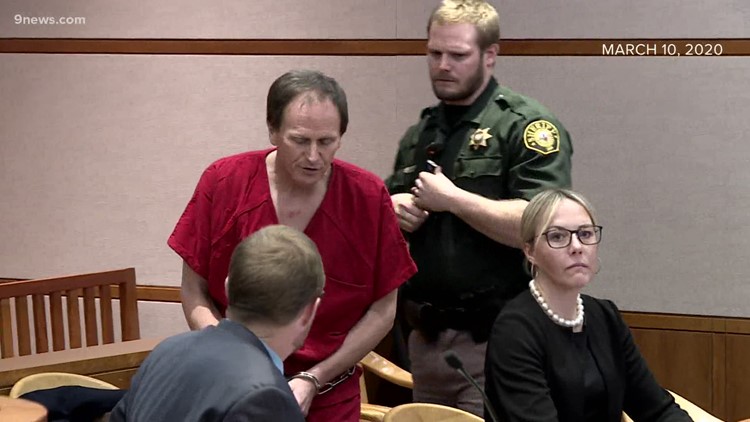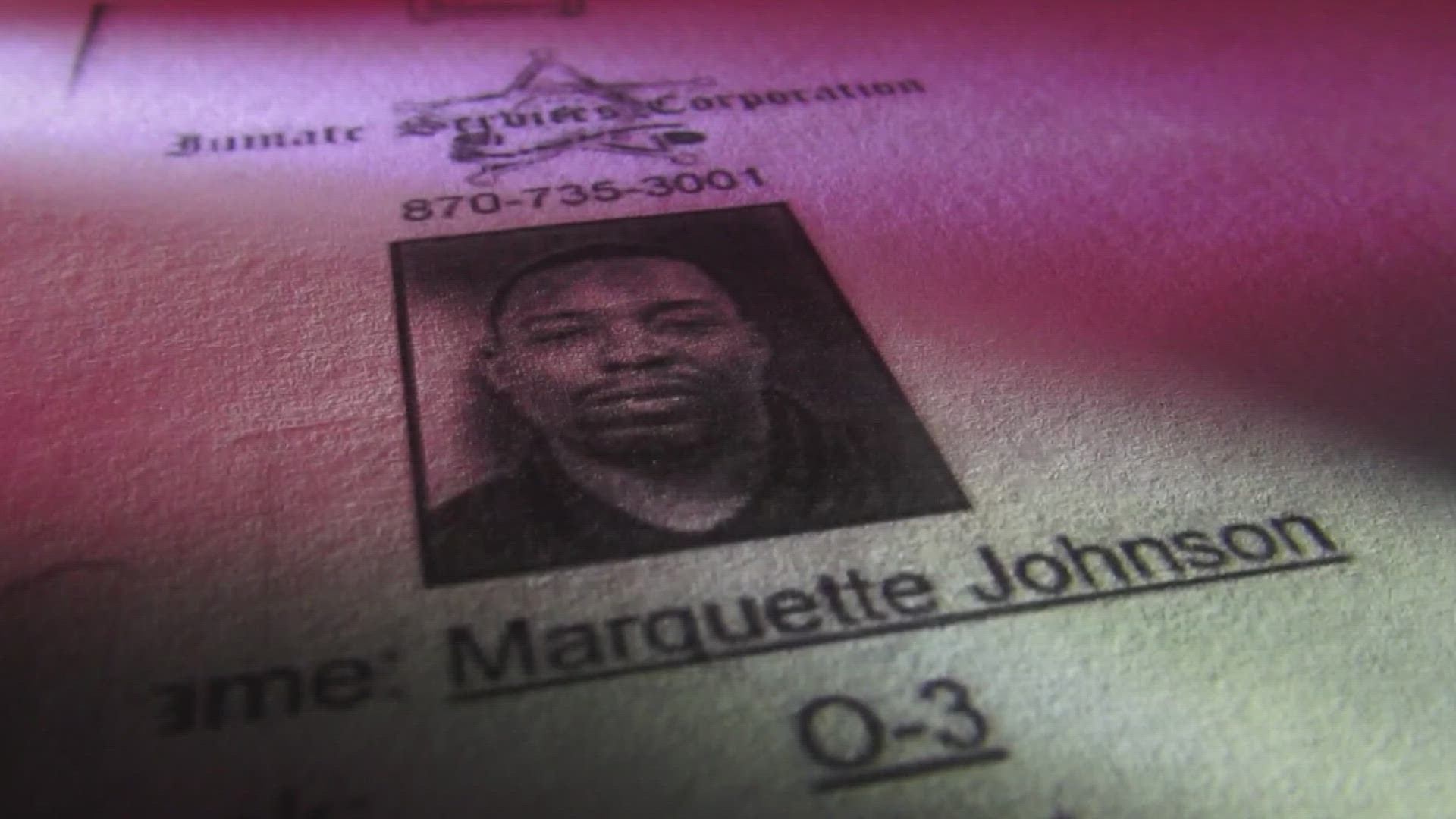JEFFERSON COUNTY, Colo. — A long-simmering dispute between prosecutors and defense attorneys in two high-profile cold cases – 1984 hammer murders in Lakewood and Aurora – flared into the open Tuesday in a Jefferson County courtroom, with attorneys for the accused killer leveling accusations of prosecutorial misconduct and calling for sanctions.
The unusual scene played out in a hearing for Alex Christopher Ewing in the Jan. 10, 1984, rape and murder of Patricia Louise Smith, with defense attorneys urging the judge to remove Jefferson County’s district attorney from the case and impose penalties.
District Judge Tamara Russell denied both requests.
“I’m very hopeful that we will start prosecuting the case instead of each other,” she said.
RELATED: Judge: Evidence sufficient to send hammer murder suspect to trial in '84 rape, killing in Lakewood
Despite the fact Russell denied the defense motion, the hearing laid bare a conflict that has unfolded largely out of public view, one that began shortly after a DNA hit in July 2018 linked Ewing – then behind bars in Nevada – to both Smith’s killing and the murders of Bruce and Debra Bennett and their daughter, Melissa, six days later.
RELATED: True crime podcast BLAME examines deadly 1984 hammer attacks, fallout for those left behind
It’s a clash that is intertwined through both cases, a 9Wants to Know investigation found.
The Smith murder is being prosecuted by the office of District Attorney Peter Weir in Jefferson County while the Bennett killings are being prosecuted by the office of District Attorney George Brauchler in Arapahoe County.
Both Weir and Brauchler declined to comment after Tuesday’s hearing.
Within weeks of the DNA hit that led investigators to Ewing, prosecutors in both offices began the process of trying to extradite him to Colorado to face charges in the two cases. And the Colorado State Public Defender’s Office entered appearances on Ewing’s behalf in each of them.
Weir and Brauchler both subsequently objected – and judges on both cases ruled that public defenders could not represent Ewing until he was moved to Colorado, something that didn’t happen for more than 18 months.
The reason: State law doesn’t allow “the public defender to represent or advise any person who is physically outside the state of Colorado and who has not made a court appearance in the pending matter in the state of Colorado.”
After Ewing was extradited on Feb. 28, public defenders took over the case. That same day, Brauchler wrote a letter to Colorado Attorney General Phil Weiser, requesting an investigation of the public defender’s actions while he was in Nevada, 9Wants to Know has confirmed.
And then on March 2, the day Ewing made his first Colorado court appearance in Arapahoe County in connection with the Bennett case, Brauchler’s office filed a notice of a “potential conflict of interest” for the public defender’s office. In it, prosecutors raised the issue of the public defender’s effort to represent Ewing while he was still in Nevada.
District Judge Michelle Amico, who is presiding over the Arapahoe County case, ordered that filing “suppressed.” That means the public doesn’t have access to it.
When Ewing made his first court appearance the following week in the Smith case, Jefferson County prosecutors filed documents detailing the notice that had been filed in Arapahoe County – but they didn’t classify them as “suppressed,” which drew a rebuke from Judge Russell.
“That clearly is a problem,” she said that day and subsequently suppressed all the records in that case that deal with the public defenders and their work on Ewing’s behalf while he was in Nevada.
It was against that backdrop that the protracted legal fight took center stage at Tuesday’s hearing.
It began when Stephen McCrohan, one of Ewing’s public defenders, accused the prosecutors in the Smith case of working to “drive a wedge” between the accused and his attorneys.
“Beginning from all the way back in 2018, our position is the district attorney has been operating to deny Alex Ewing his Sixth Amendment right to counsel,” McCrohan said.
Once Ewing was extradited, McCrohan asserted that the Jefferson County prosecutors “basically conspired” with their Arapahoe County counterparts in an effort to “prejudice” Ewing, in part by making public a document that was suppressed, which he noted was a violation of a court order.
He also contended that Jefferson County prosecutors incorrectly suggested that public defenders traveled to Nevada to meet with Ewing – an assertion based on prison visitor logs. According to McCrohan, that visit did not happen.
“When you make a statement in a pleading that an attorney has done something, you have an obligation to investigate to make sure that is true,” McCrohan said.
McCrohan further suggested prosecutors were trying to poison the jury pool. And he said that in addition to removing the district attorney’s office from the case that the judge should impose sanctions, which he said could range from a jury instruction that prosecutors violated a court order all the way up to dismissal of the charges.
Deputy District Attorney Alexandra Brady began her response by complaining that McCrohan had repeatedly mispronounced the name of another prosecutor. She took issue with the suggestion that the prosecutors were trying to taint the jury pool.
“I’ll outright deny that,” Brady said.
And she said prosecutors did not know the Arapahoe County notice was suppressed when her office filed it in the Jefferson County case, suggesting it was an honest mistake.
“There’s no bad faith on that issue,” she said. “We’ve acknowledged that misstep and done what we could to rectify it.”
Removing the prosecutors, she argued, could only be done in extreme circumstances – false statements in court, perjured testimony, or police misconduct, for instance.
Judge Russell agreed, saying that step could only be done in “special circumstances whereby it would be unlikely the defendant would receive a fair trial.”
“In this case, I think that things got started off on the wrong foot, that the people clearly filed something they should not have – I’ve made that comment a number of times,” she said. “It is now suppressed. … I do not have any evidence in front of me about a continuing problem.
“That issue has been argued, and we’re done with it.”
Ewing, now 60, had been convicted of attempted murder and other charges after an attack in Nevada that also occurred in 1984, seven months after the Colorado slayings.
He faces four separate counts of first-degree murder in the attack on Smith, a 50-year-old interior decorator who was raped and beaten to death with an auto-body hammer in the Lakewood townhome she shared with her daughter and grandchildren.
One murder count alleges he killed Smith after deliberation; the other three allege he killed her in the commission of another felony – robbery, burglary, and sexual assault.
Earlier in Tuesday’s hearing, Judge Russell set Ewing’s bail at $1 million – but there is no chance he will be released. His attorneys said he has no money, he has an unfinished sentence in Nevada, and he is being held without bail in the Arapahoe County case.
There, he faces six counts of first-degree murder in the Bennett killings, one for each of the victims alleging he killed them after deliberation and one for each of the victims alleging he killed them while committing another felony.
Although the murder weapon wasn’t found, a coroner concluded a claw hammer was used in the attack on the family, which left the couple’s other daughter, Vanessa, critically injured.
He is scheduled to return to court Oct. 8 in Arapahoe County and Nov. 6 in Jefferson County.
Contact 9Wants to Know investigator Kevin Vaughan with tips about this or any story: kevin.vaughan@9news.com or 303-871-1862.
SUGGESTED VIDEOS: Investigations from 9Wants to Know



